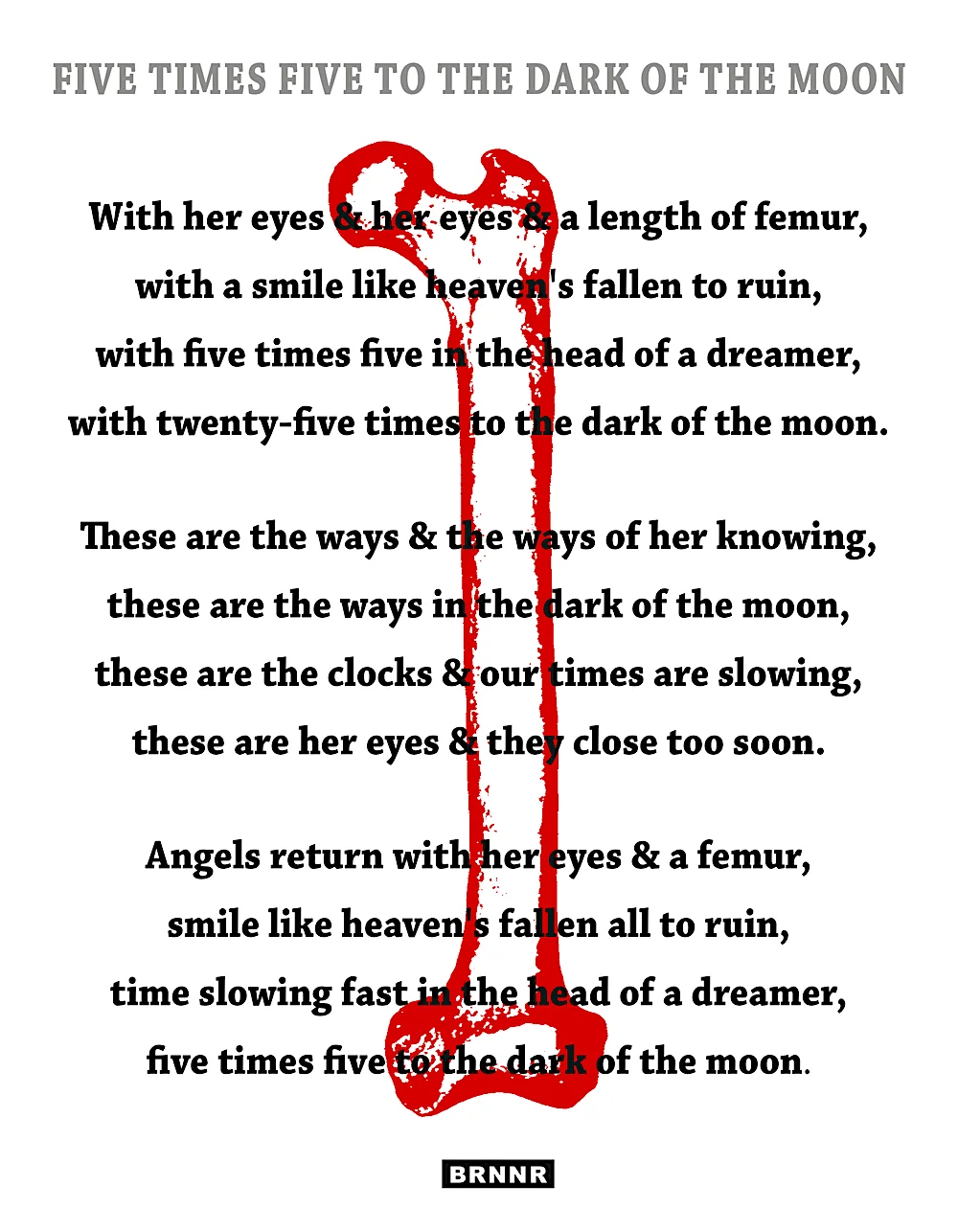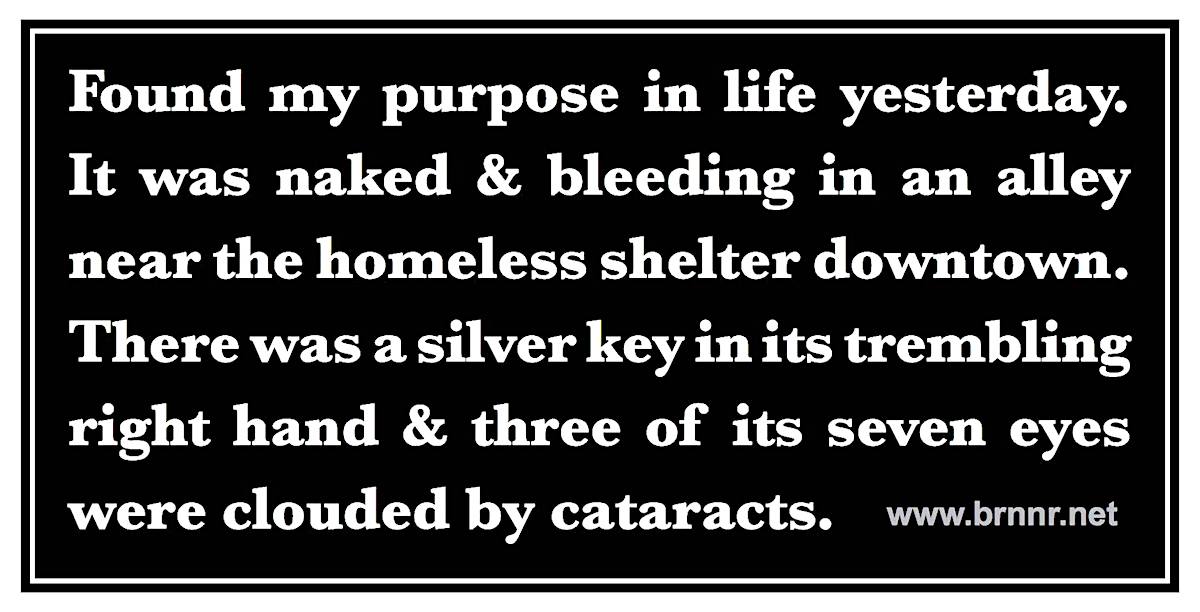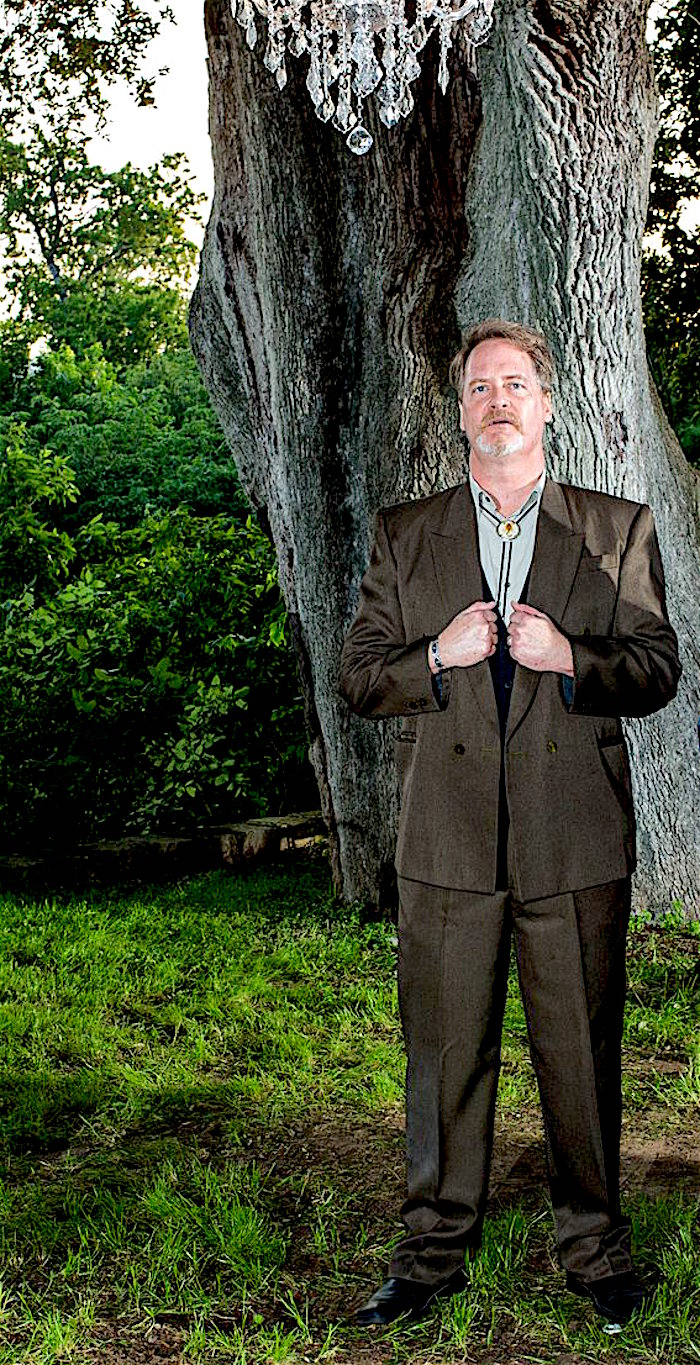POSTER: TWO-COLOR SCREENPRINT
And so to bed
Zentai Love
Options
Former home of Austin’s Rude Mechs,
the most consistently, relentlessly brilliant theatre company
in the history of Texas. They’re still very much around, those Rudes,
still tearing up the performative landscape in compelling fashion
in a variety of venues; but this old epicenter of creation will be missed.
The Old Girlfriend
The old girlfriend who still has your copy of The Crying of Lot 49.
The old girlfriend who had a cat that was like thirteen pounds of half-reptilian bitterness & hairy spite.
The old girlfriend who you helped to hobble around when she was on crutches with a badly sprained ankle.
The old girlfriend who you still think about whenever you're looking up at the stars in a clear night sky.
The old girlfriend who eventually moved in with your other old girlfriend & now they're married and both, somehow, pregnant.
And didn't invite you to the baby shower.
Cousin pissed off one of those fuckers from the Unseelie Court
Cousin pissed off one of those fuckers from the Unseelie Court, now he's got a sapling for an arm & talks incessantly of dust.
"The dust of this world," he says, waving the young tree that extends from his left shoulder, "it fills my lungs, it drowns them in dust."
"Everywhere the dust comes in," says my cousin, trembling. "It comes in and it suffocates the light. Do you see the dust, Brenner? Do you?"
He looks at me, his eyes imploring empathy, his flesh hand twitching at his side.
Don't know what to say to the guy, my favorite aunt's son.
Don't like to stand there, pretending not to look at the bright lichens on his sapling arm.
DON'T LIKE TO THINK ABOUT THE DUST
"The wound is the place where the light enters you."
The 13th-century Sufi mystic and poet Jalāl ad-Dīn Muhammad Rūmī said that, approximately, and it’s only one of the many wise things he said. They’re also the only words of his that are given voice in the quotation-strewn disappointment that was Ava DuVernay’s cinematic version of Madeleine L’Engle’s A Wrinkle In Time.
My favorite ex-wife, the playwright Molly Rice of Pittsburgh’s Real/Time Interventions, who I was still living with many years ago when I finally read L’Engle’s classic, she has a similar quotation as part of her Facebook profile. It’s from a more easily verifiable Rumi poem called “Childhood Friends,” and the part that Molly quotes is this:
Keep looking at the bandaged place.
That’s where the light enters you.
Anyway, you get the basic idea – as did Leonard Cohen and so many others – and can appreciate that it’s a hell of a fine metaphor.
The situation is a bit more than metaphorical for the arachnids of this world, though, did you know? It’s downright literal, especially for the multitudes of spiders with all those slit sensilla patterning the outside of their bodies.
Slit sensilla are an example of what entomologists generally refer to as mechanoreceptors: sensory organs that are a working part of, or are in any case enabled via, the exoskeletons of arthropods.
It was originally thought that the sensilla were actual slits all the way through the surface of the spider – like a wound, if you get me – but further research has revealed that, no, the sensilla are just built-in thinnesses of the exoskeleton, thinnesses that abut a dense array of nerve endings and other such sensory apparatus. Thinnesses that allow the creatures to feel more deeply and precisely the vibrations of their environment.
“Kid almost started crying when I dissed his science fair project,” someone might say about a young Peter Parker, years before that fate-marked geek is chomped on by an irradiated arachnid, “he’s so fucking thin-skinned.”
Kind of like that, but accurately real: hypersensitive indentations all along the exoskeletons of spiders, and especially along their spidery, hydraulically powered legs. And the most distinctive pattern of slit sensilla is when those slits are manifest in the shape of a lyre.
You know: the stringed instrument of Orpheus in the old Greek myths. The golden lyre gifted to that greatest of musicians by the god Apollo. The same lyre that Orpheus would later use to keep the seductive Sirens from killing Jason off (and countless screaming Argonauts). The instrument that the constellation is named after – Lyra – that’s also the first name of a certain Miss Belacqua in Philip Pullman’s His Dark Materials trilogy (the first book of which, The Golden Compass, was made into a studio-crippled yet still sufficiently wonderful cinematic version by Chris Weitz).
Belacqua – although young Lyra’s surname was superseded when the king of the panserbjørne decided that her true appellation is Silvertongue – Belacqua is, more classically, the name of a minor character in Dante Alighieri’s Purgatorio. As I gleaned this fact during one of my recent forays through Wikipedia, I was reminded of when my son was still in high school and told me that he’d just finished reading Dante’s Inferno for class.
“Yeah?” I said. “How was it?”
“Eh, you know,” he said with a shrug, “it’s Christian fanfic.”
The apple don’t fall far from the tree of knowledge, tell you what.
And it occurred to me, while thinking about the instigating texts for that divinely comedic fan fiction, that the whole Crucifixion deal was just the mythic Nazarene’s elaborate suicide-by-cop.
I mean, right?
And how often our species achieves its arcane quota of internal culling by having the more enlightened individuals, or at least the more sensitive ones, kill themselves. Like Jesus did, in my seemingly glib but quite serious interpretation; and less, ah, baroquely, Sylvia Plath and David Foster Wallace and Jack Cole and Virginia Woolf and Robin Williams and Thomas Disch and Anthony Bourdain come readily to mind.
The list goes on, of course, far beyond the pantheon of exited celebrities, and – it’s a long list, oh my darlings, it’s a long sad unceasing list.
All the people, their deeper sensilla overwhelmed with the stimuli of existence, removing themselves from this web of life while the rest of us continue to trudge or even dance along and somehow withstand all the constant microaggressions of light, of motion, of pressure, of sound. Of the hell that is, sometimes, other people.
Of, because we’re human, our own consciousness.
The rest of us. The walking wounded, as it’s said. Who would do well to keep their eyes on the bandaged place.
THE WAY
1. The way, during the months-long rainy seasons in Liberia, my sister and I would run outside to play after a storm and our mother would always shout, “Put some shoes on! You’ll get ringworm!”
2. The way, during ninth grade at the International School in Dhahran, I never got back my paperback copy of Philip José Farmer’s Doc Savage: His Apocalyptic Life, because the friend I’d loaned it to killed himself three weeks later.
3. The way, during the last few weeks of basic training at Lackland Air Force Base, Martinez would sit on his bunk & shine his boots for at least an hour each night, working that Kiwi polish in with cloth torn from an old T-shirt, spitting on the slick black leather and working the polish in some more, over and over, layer after layer, until it was time for lights out.
4. The way, during the months I lived in a Scientologist-run apartment building in Los Angeles, the lobby bulletin board was usually crowded with index-card notes from tenants wanting to sell their used E-meters.
5. The way, during the reception for Mark Greenberg’s “Be Strong For Grandma” exhibition of paintings in downtown Orlando, when I referred to my pet boa constrictor as “kind of like a legless limbic system,” some education-proud woman snarled at me, “That’s not how the brain works! You shouldn’t talk about things you don’t fucking understand.”
6. The way, during my marriage to Molly Rice, I once explained black holes to her — and, when I told her how their gravitational pull is so strong that not even light can escape, she started crying. And the next day, when I told our Magnolia Cafe co-worker (and Molly’s former bandmate) Greg “Psycho” Jones about her reaction, he said, “Yeah, that’s the difference between me and Molly: Tell her about a black hole, she’s gonna cry. Tell me about a black hole, I’m gonna set a fucking house on fire.”
7. The way, during our quotidian lives, we walk again and again through deepening forests of memory and sometimes discover the brightest bodies of fungus growing on trees that were previously bare.











